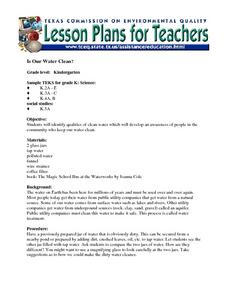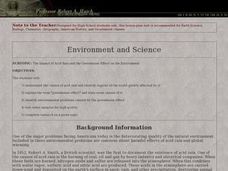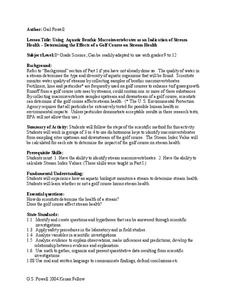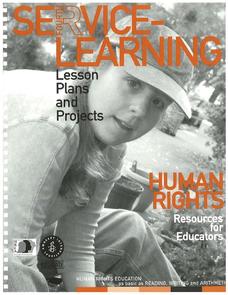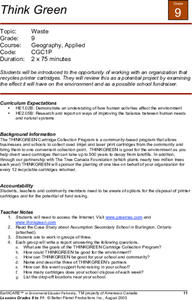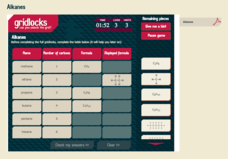Curated OER
Tracking Trace Elements
In this trace elements worksheet, students use a chart showing trace element concentrations and a map to complete 4 short answer questions.
Curated OER
Is Our Water Clean?
Students identify qualities of clean water and develop an awareness of people in the community who keep our water clean.
Curated OER
Let us Help
Learners explore water conservation. In this ecology and civic responsibility activity, students identify agencies that monitor and help improve water quality and describe what they do. Learners research these organizations and work in...
Curated OER
Is Our Water Clean?
Students identify qualities of clean water which will develop an awareness of people in the community who keep our water clean. This lesson has a literature tie-in with the "Magic School Bus" series.
Curated OER
The Impact of Acid Rain and the Greenhouse Effect on the Environment
Students study acid rain and complete several activities that show how it affects the environment. They role play members of the community involved in a major decision involving the protection of the environment.
Curated OER
Cleaning Up
Young scholars demonstrate how to be a philanthropist. In this philanthropy lesson, students read the story The Wartville Wizard and discuss ways to become a philanthropist. Young scholars participate in a good deed by volunteering to...
Curated OER
Zebra Mussels and Water Pollution
Research the proliferation of zebra mussels and their effects on local bodies of water. The class obtains zebra mussels and examines them, identifying their basic structures. They brainstorm ways the mussel may have been introduced to...
Learning Games Lab
Cattle Feeding
Finding a balance between too much protein and not enough doesn't have to be a guessing game. Young scientists use an interactive lesson to learn how to calculate protein content in cattle feed and how to mix feed to create the ideal...
Kenan Fellows
Determining the Effects of a Golf Course on Stream Health
Do golf courses affect the water organisms in nearby streams and ponds? Small groups collect samples of water upstream and downstream from a golf course and analyze the macroinvertebrates found and the stream index values of the two...
Amnesty International
Human Rights and Service Learning (Part 1)
What better way is there to teach about human rights than by seeing them firsthand? Introduce your class or club to the spirit of service through a myriad of service project ideas. First in a series of human rights instructional...
Cornell University
Fibers, Dyes, and the Environment
Nanofibers can be made through electrospinning or force spinning in order to reduce the negative impact on the environment. Pupils study the role of fibers and dye on the environment through a series of five hands-on activities. Then,...
Curated OER
Dirty Mud
Students examine geological information to study benthic marine habitats. For this watershed project, students examine wetland habitats and land uses in a watershed. They will use geological information to discuss the impact of pollution...
Curated OER
Reduce, Reuse, Recycle
Learners understand the process of recycling. They investigate how it improves the environment. They read the story "Don't Pollute" by Stan and Jan Berenstein. They analyze trash and sort it into bins.
Curated OER
Environmental Issues
For this environmental issues worksheet, students are given 10 current topics that are problems in our environment today. They complete sentences about each topic by filling in the blanks with the appropriate terms. Some of the issues...
Curated OER
Lesson 5: Technology: Conveniences and Consequences
Students identify positive and negative impacts of technology. In this technological advancements activity, students consider how toxic pollution affects the Earth and its inhabitants. Students participate in 3 activities that allow them...
Curated OER
Environmental Problems
Students explore the environment by completing environmental problem worksheets. In this pollution lesson, students identify the biggest threats to our environment such as deforestation, global warming, and pollution. Students utilize...
Curated OER
Exploring the Science of Oil
Students analyze the basic techniques used to find and produce oil. They also create a small project that allows them experiment with solutions to maximize the amount of colorless liquid produced from colored solutions.
Curated OER
The Effects of Alcohol and other Teratogens: A model using Zebrafish
Young scholars investigate the interference of various drugs on an embryo through experimentation. This is an open-ended lab to allow students to see effects of various chemicals humans choose to put in their bodies and create...
Curated OER
Oceanic Absorption- Oceanic Sequestration
Students examine the techniques that may be used to reduce carbon dioxide in the atmosphere. In this pollution lesson students simulate oceanic sequestration using chemistry.
Curated OER
Oceanic Absorption- Oceanic Sequestration
Students examine the different techniques that may be used to reduce carbon dioxide in the atmosphere. In this ocean pollution instructional activity students divide into groups and complete a lab to see how the ocean holds carbon dioxide.
Curated OER
Think Green
THINKGREEN has a computer printer cartridge collection program. After reading the story of how Assumption Secondary School in Burlington, Ontario started participating in the THINKGREEN recycling program, pupils work in groups of three...
Royal Society of Chemistry
Everyday Chemicals (Ages 11-14)
Caustic soda helps break up clogs in drains in many homes. Scholars match 10 chemical names to their everyday names; for example, caustic soda is sodium hydroxide. Then, they complete three different grid puzzles practicing this skill.
Royal Society of Chemistry
Esters from Alcohols and Acids
Fats and oils often contain esters, which sometimes find their way into perfumes due to their pleasant smells. Scholars match the name of esters made from four different types of alcohol and four different types of carboxylic acids....
Royal Society of Chemistry
Alkanes
Alkanes contain only single bonds and have no functional groups. Scholars match the properties of six alkanes in a series of four puzzles. Problem solving and logic help cement the concepts with repetition.



